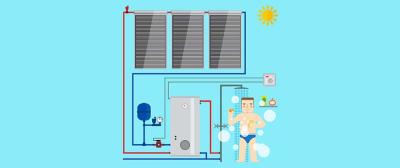Solar Panels for Flats and Apartments in the UK: A Guide
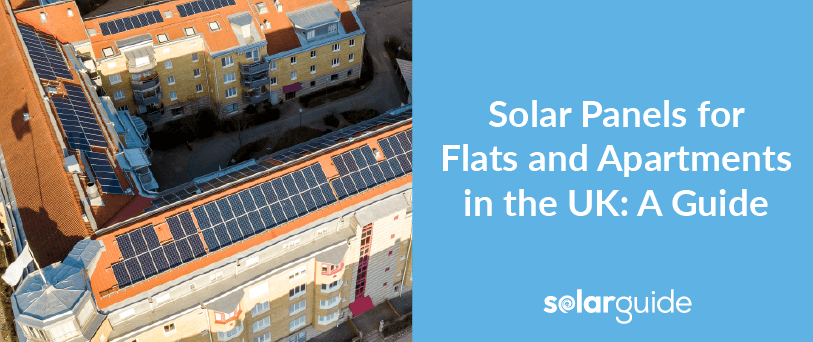
Installing solar panels for flats and apartments in the UK can be a beneficial practice, especially if you are looking to cut down on your electricity bills. This is because solar panels have gotten more efficient and cheaper in the past few years allowing for many more types of homes to install them with ease. However, there are many things one must consider before installing them.
This article will delve into the costs and installation factors as well as the pros and cons of solar panels in flats and apartments. We will cover the best options for the amount of space you have and where you can put a solar panel system.
However, if you've already made up your mind about getting some solar panels for your home, you'll need to find an installer that you trust. Ordinarily, this will require finding someone in your area and checking if they are reliable, which can take hours of time and effort in doing the due diligence. Instead, try out our service so you can instantly receive up to 4 free, non-binding solar quotes from thoroughly vetted, professional installers in your area. Click the button below to get started.
Get Free Solar Panel Quotes: Get quotes and compare prices.
Can you place solar panels for your flat or apartment in the UK?
Yes, you can place solar panels in flats and apartments, however, the process is a bit more complicated than in most detached houses. You may have to talk to your landlord about whether you can install them and check the building codes, regulations, and structural guidelines for your particular apartment.
If you live in a listed building, you will need to apply for consent and planning permission. Similarly, you may need to reach out to your city council if your house is in a conservation area. Make sure you have informed your neighbours as it can get you into legal trouble if you don't.
Despite these hurdles, solar panels are increasingly popular as the rate of homeowners and renters making use of them climbs higher every year. Industry stats indicated that over 50,700 households installed panels between January and March 2023. This number is almost double that of the previous year and the highest in 7 years since.
Similarly, beneficial policies for solar panels and their installation, including the 0% VAT scheme and the ECO+ scheme, have made it easier for the public to obtain them and many of these policies apply to apartments as well.
Solar panel prices have also dropped consistently over the past decade along with the advent of various solar panel grants and schemes that help you ease the purchase and installation costs. It's an ideal time to buy new panels, especially if you plan to keep living costs down, as they can alleviate more than £1,005 annually on your electricity bills in some cases (assuming they have an ideal space to catch sunlight).
You can also potentially earn a bit of money by giving excess electricity generated back to the grid. This is contingent on whether your lease or housing contract allows this, otherwise, the apartment block owners may keep any funds generated.
In terms of energy consumption, here are the averages for different types of homes and how many 400W (Watt) panels you might need and what kilowatt peak (kWp) they achieve:
| Household size | Solar PV System | Roof Space | Annual Energy Output | Number of 450W Panels | Price |
|---|---|---|---|---|---|
| 1-bedroom flat | 2kW | 8m² | 1.700kWh | 4 | £2,500 - £3,500 |
| 1-2 bedroom house | 3kW | 12m² | 2,550kWh | 6 | £4,500 - £5,500 |
| 3 bedroom house | 4kW | 16-20m² | 3,400kWh | 8 to 10 | £5,000 - £6,000 |
| 4-5 bedroom house | 6kW | 26 m² | 5,100kWh | 13 | £9,500 - £10,500 |
However, these numbers also assume that you have the ideal location for optimal solar panel efficiency. There are several criteria that decide what the ideal placement for your solar panels is.
Where can you place solar panels in your flat or apartment?
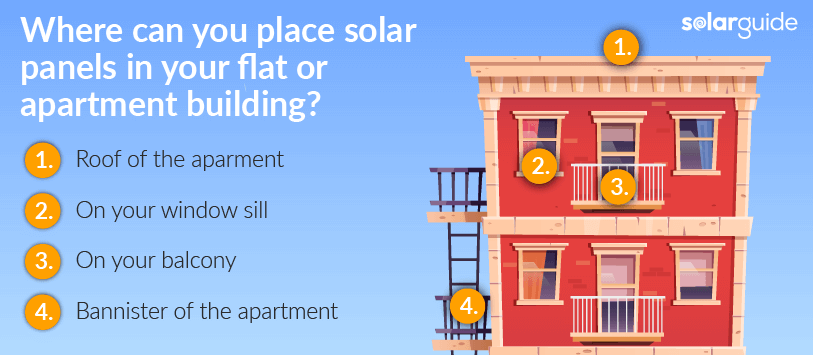
While apartments don't have as much space as the average detached house, there are still options that can work within the residents' means.
Solar panels can be placed on roofs, balconies, window sills, and outside bannisters. All of these options have their own advantages and disadvantages. Thus, finding the right spot for your solar system requires that it meets certain criteria. This will mostly depend on where you get the optimal level of sunlight, which in turn determines how many solar panels you need to meet your power requirements.
Placing solar panels on roofs is the ideal option, but this is not always possible since you will need the permission of your building owner or management companies. If you can not install panels on the roof, you can install them on a wall with the proper frame. Similarly, if you are on the ground floor, you could get permission to install them on the ground or in a garden.
Where you place solar panels should also take into account how many panels you need and whether that placement can achieve optimal efficiency.
If you are looking to install an extensive setup for maximum energy generation, how many solar panels you need can vary depending on a number of factors. These include your energy consumption, level of shading, ideally finding a north-facing direction, and finding a roof pitch of 30 to 40 degrees (if you're placing them directly on the roof or using an additional mounting frame to properly angle them).
If you have a location that meets these requirements, you can get the most out of your solar panels. Since the average home utilises roughly 1,900kWh, you may need a system that produces between 1.8kWh to 2kWh per day which will require a minimum of 12m2 of space either on your roof or some other area.
Conversely, smaller portable models can be a good starting point that helps manage some of the electricity burden.
Solar panels on your balcony
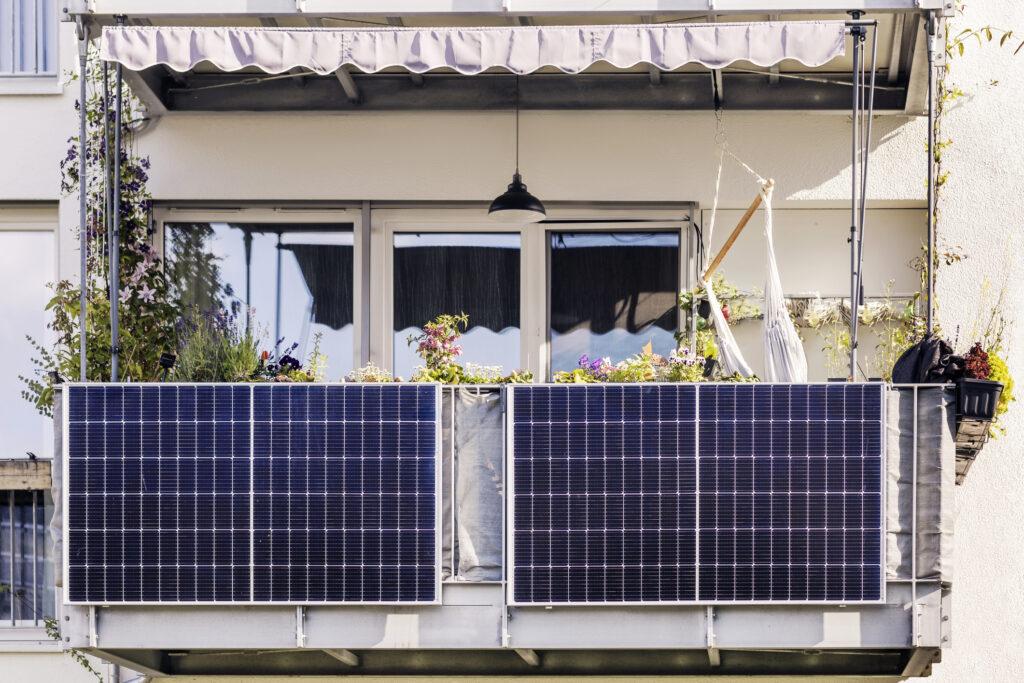
Balconies can offer ample space to place solar panels of certain types. However, most people may also want to use their balcony for its intended purpose rather than crowding it with solar panels.
In such cases, the ideal option for a balcony is a plug-in or plug-and-play solar panel system. If you place these panels in a spot that receives adequate sunlight, you can then connect them to an outlet to power your home or some appliances. Another advantage of these panels is that you can take them with you if you need to move houses since they aren't installed into the structure of the house.
Smaller systems produce between 0.3kWh and 1.5kWh (kilowatt hours) per day. These panels are generally for recreational vehicles or camper vans, so their output isn't as powerful as others. Although this setup doesn't cover all your electricity needs, it will still help a lot with appliance energy consumption.
While this solution is physically viable for most balconies, you may want to closely consider whether they may be inconvenient for your neighbours or whether you want to dedicate a fair amount of balcony space to solar panels. You may also want to consider the relevant solar panel regulations and building codes before you opt for these.
Plug-and-play systems can range from £500 to £4,000. They are cheaper than the more heavy-duty solar panel systems but you need to place them in an ideal location to make the most of them. As mentioned previously, you will need to mount the panels in an area that receives adequate sunlight for an extended time and is unobstructed by shading. This would also be ideal on a balcony that allows for the panels to be facing north.
Your other option is to get solar panel roof tiles or a solar array. Although they take up space, they generally have better energy efficiency. These can also involve a lot more hassle in terms of installation and permissions, so they may not be suitable for every home, especially if it’s a rented property.
Whatever solar panel system you get, balcony setups can be fairly complex, so you may want to consider finding an installer that can help you out. Rather than spending the majority of your spare time researching and vetting them yourself, you can use our service to get in touch with multiple trusted installers quickly and easily. Click the button below to receive up to 4 free, non-binding quotes.
Get Free Solar Panel Quotes: Get quotes and compare prices.
The pros and cons of solar panels for your flat or apartment in the UK
While there are many benefits of solar panels that can make them a worthwhile investment. When it comes to apartments and flats, there are extra considerations that you should keep in mind. Solar panels can be quite an investment, which is why it's important to weigh the pros and cons and compare which ones are most applicable to your home.
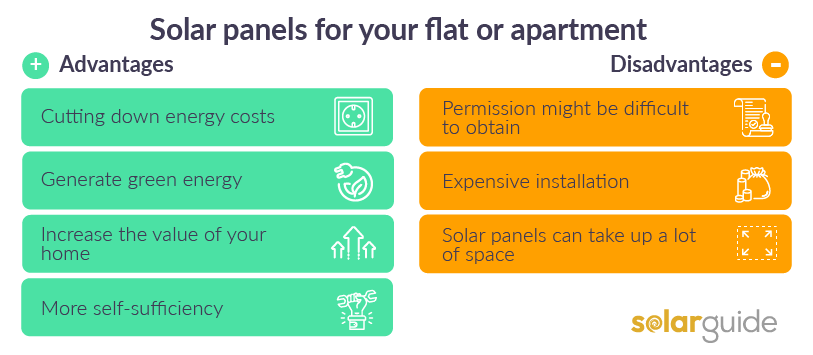
Advantages of solar panels for flats or apartments
Cutting down energy costs: Getting free energy directly from the sun means your electricity bills will be lower (potential savings on energy bills of more than £1,005 per year). Gain a bit of independence from the energy grid. You can get your return on investment in a few years.
Generate green energy: Cut free from the fossil fuel-based energy grid. You can reduce your carbon footprint and help the environment at the same time.
Increase the value of your home: As a homeowner, you can improve property value by installing solar panels. They are more and more popular with the UK public, with a majority wanting them in their homes. This can be a great Unique Selling Point for your flat.
More self-sufficiency: Storing power on a battery allows you to be more self-sufficient and less reliant on the grid. You will be better off than most if the power goes out and will be better equipped for rising energy costs.
Disadvantages of solar panels for flats or apartments
Permission might be difficult to obtain: Obtaining permission for installing your solar panels is often outside your control. Building regulations may disallow it.
Expensive installation: Installing solar panels can be expensive. A setup that covers all your energy expenses can be £4,000 to £5,000. Although you can get cheaper ones like plug-and-play systems, they will not cover all your energy costs.
Solar panels can take up a lot of space: A solar panel that can fully cover your needs, assuming you need a system that can generate 3kW to 4kW, can take up 16m2. You may not have the space for this and, even if you do, you will have to give it up for the panels.
Should you install solar panels in a flat or apartment?
Installing solar panels for your flat or apartment can be fruitful for cutting down costs and curbing carbon emissions. However, this will require understanding the rules and regulations for your building as well as obtaining permission from your landlord. While it's a bit more complicated than attaching panels to a house, your flat can benefit from solar panels if installed correctly.
Installing a solar panel setup that covers all your energy costs is a major investment which can cost roughly £4,000 to £5,000 for a decent-sized apartment, excluding installation costs. Think carefully about whether the cost is outweighed by the benefit, which can be recouped but it will take a few years (they can save up to £1,005 on electricity annually). Whether you can install a full system can depend on the available space you have.
Another option that takes less effort and room (compared to a full solar system installation) is to get a plug-and-play system for your balcony or similar space. It is less of a hassle to install and you can take it with you if you need to move. It may not be as powerful, but it can offset some of the bills.
There are multiple solar panel grants for the purchase of panels and their installation, including the 0% VAT scheme and the ECO+ scheme. These can help alleviate some of the installation costs. However, dividing the responsibility of maintenance and solar panel upkeep can be tricky in apartments since they are shared spaces. Without proper planning, it's best to clear all of that up with the owners of the building and the other residents.
In the end, it's best to opt for the system that best suits your needs, finances, apartment space, and type of home.
Quotes for solar panels in your flat and apartment
No matter what system you choose, you will need engineers that you can trust to do the job. This can be a labour-intensive task when it comes to searching for professionals, vetting the best ones you can find, and comparing their offers on your own.
Luckily, you can make this entire process easier by using our service which can instantly put you in contact with multiple trusted installers in your area and provide you with up to 4 free, non-binding quotes. Click the button below to check out what they have to offer.
Get Free Solar Panel Quotes: Get quotes and compare prices.
FAQ
Can I have solar panels if I live in a flat?
Yes. Even if you don't have a space on your roof, you can still make use of plug-and-play solar panels. Depending on the type of apartment you have, there are many options for where you can place solar panels.
How many solar panels does it take to run a flat?
A system that can produce 2,600kWh to 3,000kWh will probably be ideal for a 3-person apartment. This can require 8 or 9 panels at 400W capacity. However, these numbers can vary based on how big your flat is or how much energy it consumes.
Can I install solar panels on my balcony in the UK?
Yes, it is possible to install solar panels on your balcony, especially with plug-and-play solar systems. These have their own advantages and disadvantages that you should consider.
Are there grants for solar panels for flats?
There are multiple grants for solar panels and their installation, including the 0% VAT scheme and the ECO+ scheme. These can help keep down the excessive purchase and installation costs. You can make use of these with the help of a trusted solar panel installer.
Find local, MSC certified Solar Installers
Start your quote
Find local, MSC certified Solar Installers












